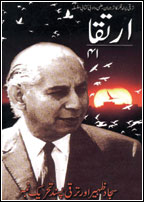| |
By Mushir Anwar

THAT literature will meet our criteria which has thought, passion for freedom, beauty, a constructive spirit, the light of life’s realities; that moves, creates a turmoil and turbulence, makes us restless, does not put us to sleep since it would be akin to death if we sleep more. Thus Munshi Premchand defined the objectives of the Progressive Writers’ Movement in his presidential address at the movement’s first congress held in 1936. The standard bearer of this movement was Sajjad Zaheer, a scion of nobility who renounced the advantages of his birth to work for the cause of the downtrodden. Celebrations of his birth centenary beginning last year have revived some spirit of the time and good men who are still there have tottered to the aid of the Party.
The 41st edition of Irtiqa is devoted to Banney Bhai, his pet name, and the Progressive Writers’ Movement that he founded. It is a document of considerable interest for the present day reader who can find a great deal of thoughtful material on the life and work of Sajjad Zaheer as well as a candid discussion on the course of the movement, its achievements, drawbacks and its likely future. The issue presents a selection of the papers that were read at centenary conferences and seminars in the subcontinent. A brief account of the proceedings of the conferences held in Karachi and Lahore as well as in India has been covered for the issue by Jamal Naqvi.
Sajjad Zaheer saw in literature that force which could bring about a qualitative change in the life and thought of the people since it anticipated the profound and the deep unseen as well as the surface tensions springing from the font of ambition that not only make men dream but goad them to their realisation. But that in effect meant changing the aesthetics of art which some thought to be inflexible. Sajjad Zaheer who believed in scientific thinking that changes with new discoveries and does not remain wedded to old concepts saw no harm if literature could give a helping hand in social transformation. Why should this be so abominable, asks Dr Muhammad Ali Siddiqui since the artist has never been unconcerned about the form and content of his creation and its relevance to society. A piece of literature is after all a narrative. It is saying something. It is an expression. It is not therefore possible for art to be dumb. Sajjad Zaheer like other progressive thinkers wanted literature to be alive to the human situation and its needs. What was so unliterary in that?
Wasn’t that that the Greek and Roman writers of yore sought in their tales of the gods and goddesses and hasn’t that been the motive in religious texts and hymns and dirges that embody the classic tradition? And nobody seems to have any quarrel with that.
Irtiqa holds that Sajjad Zaheer with time’s passage has become a leading symbol of the movement and its unending struggle for its ideals. He will continue to inspire others to join the caravan. That may be true, yet, it is a fact that the movement wilted which Ashfaq Saleem Mirza, in his essay on its rise and fall, blames on the excessive optimism of our armchair revolutionaries while Dr Qamar Rais sees it not so much as a reaction to the inflexibility and extremism of the doctrinaires as to the changes that came at the end of the colonial rule when it was thought that a number of objectives of the movement had been achieved and the nationalist governments banned the PWM and jailed its leaders leaving others disenchanted and prone to pursue writing in the spirit of their own creative urges and bent of mind.
Sajjad Zaheer’s centenary celebrations after years of the demise of the Soviet Union serve as a reminder that neither has history ended nor the class struggle ceased. The subjugated masses of Asia, Africa and Latin America do not see the realisation of their dreams in the nightmare of globalisation. Closer at home the voices of men like Sajjad Zaheer are beginning to echo more resoundingly as the rude sight of corporate plunder is bared to even the dim-eyed on the street. In any case the clouds of dust from the debris of the Berlin wall seem to be settling down making the vision of the dazzled and the dazed clearer. The success of Left parties in South America and reassertion of the progressive politics even in Western Europe and signs of renewal of stirrings in the Non-Aligned Movement as was seen at the Havana summit are developments that should not surprise anyone. What should be more worrying for the sages of statecraft and movers and shakers of our world is the sight of a supine mass of humanity that does not rise to claim its rights and where the intellectual class plays the courtesan.

Equality, Fraternity, Social Justice
South Asian Peoples Forum UK
www.sapfonline.org info@sapfonline.org
|